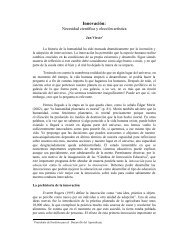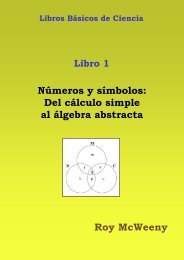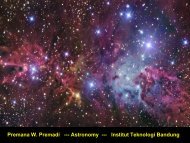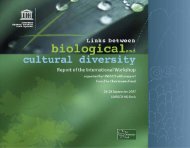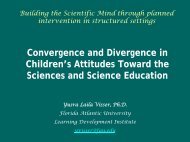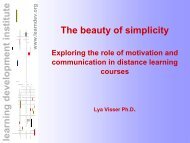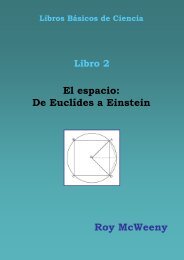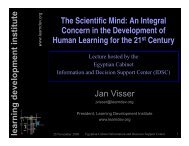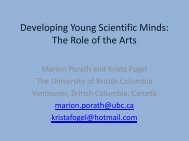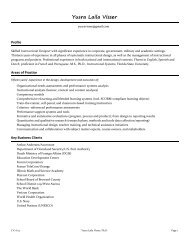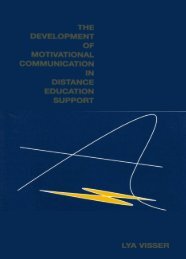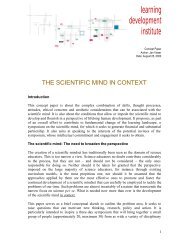The planet we live on: The beginnings of the Earth Sciences
The planet we live on: The beginnings of the Earth Sciences
The planet we live on: The beginnings of the Earth Sciences
- No tags were found...
You also want an ePaper? Increase the reach of your titles
YUMPU automatically turns print PDFs into web optimized ePapers that Google loves.
<str<strong>on</strong>g>planet</str<strong>on</strong>g> extended <strong>the</strong> time when <strong>the</strong> c<strong>on</strong>diti<strong>on</strong>s suitable for life <str<strong>on</strong>g>we</str<strong>on</strong>g>re maintained as <strong>the</strong>solar radiati<strong>on</strong> increased.Lovelock extended his ‘Gaia Hypo<strong>the</strong>sis’ to include all <strong>the</strong> natural systems active <strong>on</strong><strong>Earth</strong>, arguing that all <strong>of</strong> <strong>the</strong>se must be moderated by <strong>the</strong> effects <strong>of</strong> life, since not <strong>on</strong>lydoes life need an optimum temperature to survive, but it also needs optimum salinity in<strong>the</strong> oceans, optimum percentages <strong>of</strong> gases in <strong>the</strong> atmosphere (including carb<strong>on</strong> dioxide),optimum levels <strong>of</strong> trace elements in soils, etc. He argued that, since life <strong>on</strong> <strong>the</strong> <str<strong>on</strong>g>planet</str<strong>on</strong>g>moderated <strong>the</strong>se c<strong>on</strong>diti<strong>on</strong>s, like organisms moderate c<strong>on</strong>diti<strong>on</strong>s in <strong>the</strong>ir own bodies (suchnegative feedback c<strong>on</strong>diti<strong>on</strong>s in organisms are called homeostasis) <strong>the</strong>n <strong>the</strong> <str<strong>on</strong>g>planet</str<strong>on</strong>g> itselfalso has a form <strong>of</strong> homeostasis, and can be likened to a ‘superorganism’. It was whenLovelock suggested that <strong>the</strong> <strong>Earth</strong> itself acts like a living organism in some ways thatmany scientists disagreed with him, and many do to this day. Ho<str<strong>on</strong>g>we</str<strong>on</strong>g>ver, his ideas havebeen taken seriously and tested by many scientists across <strong>the</strong> <str<strong>on</strong>g>planet</str<strong>on</strong>g> and, whilst <strong>the</strong>yd<strong>on</strong>’t all fully support <strong>the</strong> ‘Gaia Hypo<strong>the</strong>sis’ <strong>the</strong>ir studies have developed a new branch<strong>of</strong> science called ‘<strong>Earth</strong> System Science’. ‘<strong>Earth</strong> system science’ investigates <strong>the</strong> <strong>Earth</strong>as a series <strong>of</strong> systems that interact with <strong>on</strong>e ano<strong>the</strong>r and seeks to discover how <strong>the</strong>seinteracti<strong>on</strong>s can have both positive and negative feedback effects in certain c<strong>on</strong>diti<strong>on</strong>s.It has helped us to generate computer climate models <strong>of</strong> increasing complexity, that willenable us to predict, with increasing certainly, how <strong>the</strong> global climate might change in<strong>the</strong> future.At <strong>the</strong> moment, James Lovelock is just seen as a very important scientist in <strong>the</strong> climatedebate. In future he might be c<strong>on</strong>sidered to be <strong>on</strong>e <strong>of</strong> <strong>the</strong> ‘giants’ <strong>of</strong> ‘<strong>Earth</strong> science’, likeHutt<strong>on</strong>, Darwin, Wegener and Tuzo Wils<strong>on</strong>.96



